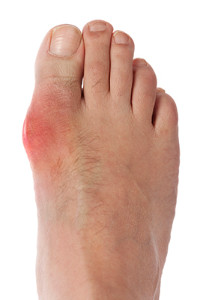 The general cause of a condition referred to as gout is an excess of uric acid that accumulates in the body. The big toe is typically affected, and obvious symptoms may include intense pain, swelling, and redness in the surrounding areas. It will often appear as an inflamed protrusion on the side of the big toe, and may affect the ability to walk. Research has shown that it may be a controllable condition and may occur because of the foods that are ingested. There may be several items that may fall into this category, including the consumption of red meat, an excessive salty foods, and any type of shellfish. Drinking excess alcohol may also lead to the development of gout, in addition to a family history of high blood pressure. Occasionally, there may be specific medical conditions in which the body has difficulty eliminating uric acid, such as kidney or thyroid ailments. The treatment for gout can vary, so it’s advised to consult with a podiatrist for a proper diagnosis.
The general cause of a condition referred to as gout is an excess of uric acid that accumulates in the body. The big toe is typically affected, and obvious symptoms may include intense pain, swelling, and redness in the surrounding areas. It will often appear as an inflamed protrusion on the side of the big toe, and may affect the ability to walk. Research has shown that it may be a controllable condition and may occur because of the foods that are ingested. There may be several items that may fall into this category, including the consumption of red meat, an excessive salty foods, and any type of shellfish. Drinking excess alcohol may also lead to the development of gout, in addition to a family history of high blood pressure. Occasionally, there may be specific medical conditions in which the body has difficulty eliminating uric acid, such as kidney or thyroid ailments. The treatment for gout can vary, so it’s advised to consult with a podiatrist for a proper diagnosis.
Gout is a painful condition that can be treated. If you are seeking treatment, contact Brent Harwood, DPM from Southeast Podiatry. Our doctor will treat your foot care needs.
What Is Gout?
Gout is a form of arthritis that is characterized by sudden, severe attacks of pain, redness, and tenderness in the joints. The condition usually affects the joint at the base of the big toe. A gout attack can occur at any random time, such as the middle of the night while you are asleep.
Symptoms
Risk Factors
Prior to visiting your podiatrist to receive treatment for gout, there are a few things you should do beforehand. If you have gout you should write down your symptoms--including when they started and how often you experience them, important medical information you may have, and any questions you may have. Writing down these three things will help your podiatrist in assessing your specific situation so that he or she may provide the best route of treatment for you.
If you have any questions, please feel free to contact one of our offices located in Fairhope, Brewton, and Atmore, AL . We offer the newest diagnostic and treatment technologies for all your foot care needs.
Read more about Everything You Need to Know About Gout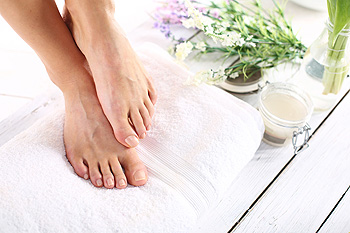 It has often been recognized that many conditions concerning the feet may be indicative of the overall health of the body. If muscle spasms in the feet are experienced, it may be a result of certain vitamin deficiencies, which may cause dehydration. Additionally, if the feet are generally cold for a majority of the time, health issues such as diabetes or anemia may be present. Swollen and tender feet may represent the body’s inability to properly circulate the blood. Gout, a form of arthritis, is an extremely painful condition that typically affects men. This ailment is often triggered by a buildup of uric acid crystals, caused by ingesting excessive alcohol or meat. A condition referred to as foot drop indicates difficulty in lifting the front of the foot. This may be a result of the body incurring nerve damage, possibly originating from a leg injury. It’s suggested to consult with a podiatrist if you are affected by any of these conditions.
It has often been recognized that many conditions concerning the feet may be indicative of the overall health of the body. If muscle spasms in the feet are experienced, it may be a result of certain vitamin deficiencies, which may cause dehydration. Additionally, if the feet are generally cold for a majority of the time, health issues such as diabetes or anemia may be present. Swollen and tender feet may represent the body’s inability to properly circulate the blood. Gout, a form of arthritis, is an extremely painful condition that typically affects men. This ailment is often triggered by a buildup of uric acid crystals, caused by ingesting excessive alcohol or meat. A condition referred to as foot drop indicates difficulty in lifting the front of the foot. This may be a result of the body incurring nerve damage, possibly originating from a leg injury. It’s suggested to consult with a podiatrist if you are affected by any of these conditions.
When dealing with systemic disease of the feet, it is extremely important to check the affected areas routinely so that any additional problems are caught quickly. If you have any concerns about your Feet contact Brent Harwood, DPM from Southeast Podiatry. Our doctor will assist you with all of your podiatric needs.
Systemic Diseases of the Feet
Systemic diseases affect the whole body, and symptoms usually are displayed in the feet. This condition can make a patient’s ability to walk unbearable. Systemic diseases include gout, diabetes mellitus, neurological disorders, and arthritis.
Gout – is caused by an excess of uric acid in the body. Common symptoms include pain, inflammation, and redness at the metatarsal/phalangeal joint of the base big toe. Gout can be treated by NSAIDs to relieve pain and inflammation, and other drugs that lower the acid levels in the body.
Diabetes mellitus – is an increase in the level of blood sugar that the body cannot counteract with its own insulin. Failure to produce enough insulin is a factor in Diabetes.
Diabetes of the Feet
Diabetic Neuropathy – may lead to damaged nerves and affect the feet through numbness and loss of sensation.
Peripheral Vascular Disease – can restrict the blood flow to the feet, and often times lead to amputation of the feet.
If you have any questions please feel free to contact one of our offices located in Fairhope, Brewton, and Atmore, AL . We offer the newest diagnostic and treatment technologies for all your foot care needs.
Read more about Systemic Diseases of the Foot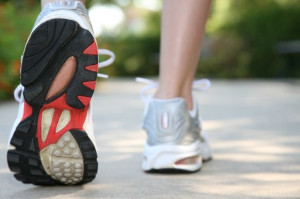 The feet are the foundation of the body, and the majority of runners are aware of the importance of choosing to wear proper running shoes. It’s helpful to be aware of your foot’s shape, as this will aid in buying shoes that fit properly. Shoes with added stability are often purchased by runners who have flat feet, and runners with exceptionally high arches are prone to choose shoes that have additional padding. Typically, most runners will go up half a size when buying running shoes, which will allow ample room for the toes to move about. When the right shoes are chosen that are a perfect fit for your feet, the sport of running may be enjoyed to its fullest extent.
The feet are the foundation of the body, and the majority of runners are aware of the importance of choosing to wear proper running shoes. It’s helpful to be aware of your foot’s shape, as this will aid in buying shoes that fit properly. Shoes with added stability are often purchased by runners who have flat feet, and runners with exceptionally high arches are prone to choose shoes that have additional padding. Typically, most runners will go up half a size when buying running shoes, which will allow ample room for the toes to move about. When the right shoes are chosen that are a perfect fit for your feet, the sport of running may be enjoyed to its fullest extent.
If you are a runner, wearing the right running shoe is essential. For more information, contact Brent Harwood, DPM from Southeast Podiatry. Our doctor can provide the care you need to keep you pain-free and on your feet.
Choosing the Right Running Shoe for Your Foot Type
To increase performance and avoid the risk of injury, it is important to choose the right running shoe based on your foot type. The general design of running shoes revolves around pronation, which is how the rolls from outside to inside when the foot strikes the ground.
If you have any questions please feel free to contact one of our offices located in Fairhope, Brewton, and Atmore, AL . We offer the newest diagnostic and treatment technologies for all your foot care needs.
Read more about Choosing the Right Running Shoe for Your Foot Type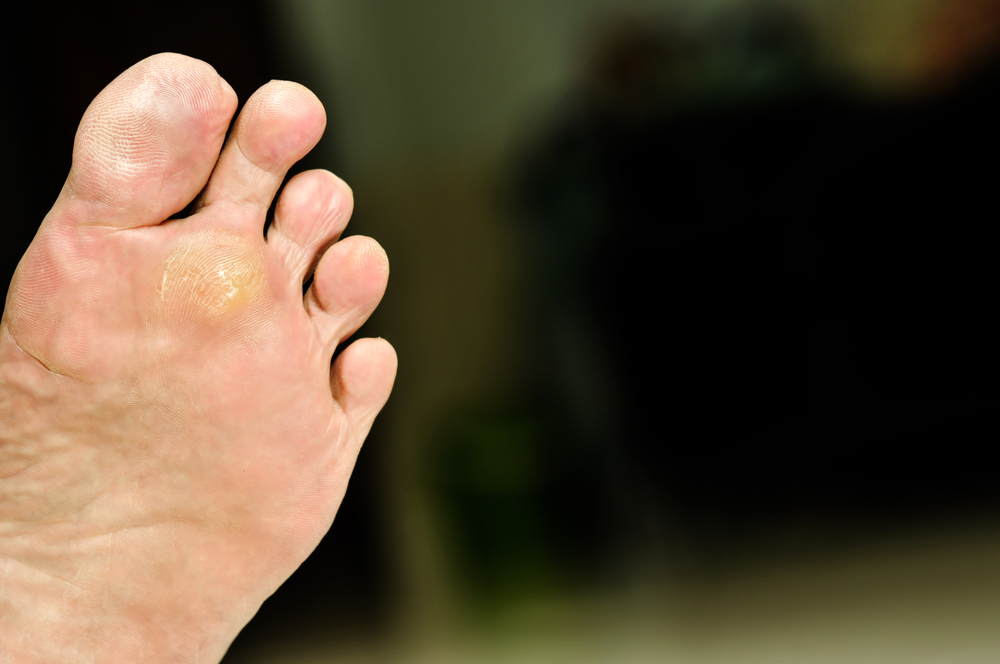 If you have a sore that produces pain on the bottom of your foot, you may have what is referred to as a plantar wart. A plantar wart generally causes severe discomfort and is caused by a virus that thrives in moist and warm environments. This type of wart will typically develop on the heel or ball of the foot, which can result in painful walking. It grows into the heel as a result of the pressure endured while walking, which is contrary to other types of warts that grow out. These types of warts originate from a virus that is known to be contagious and is generally found on wet surfaces. Common areas the virus may live on may include public showers, pools and surrounding surfaces. If you have this condition, it’s suggested to learn about preventive measures, including wearing appropriate shoes in showering areas, pools, and saunas. Please consult with a podiatrist for additional information about plantar warts and the correct treatment options for you.
If you have a sore that produces pain on the bottom of your foot, you may have what is referred to as a plantar wart. A plantar wart generally causes severe discomfort and is caused by a virus that thrives in moist and warm environments. This type of wart will typically develop on the heel or ball of the foot, which can result in painful walking. It grows into the heel as a result of the pressure endured while walking, which is contrary to other types of warts that grow out. These types of warts originate from a virus that is known to be contagious and is generally found on wet surfaces. Common areas the virus may live on may include public showers, pools and surrounding surfaces. If you have this condition, it’s suggested to learn about preventive measures, including wearing appropriate shoes in showering areas, pools, and saunas. Please consult with a podiatrist for additional information about plantar warts and the correct treatment options for you.
Plantar warts can be very uncomfortable. If you need your feet checked, contact Brent Harwood, DPM from Southeast Podiatry. Our doctor will assist you with all of your foot care needs.
About Plantar Warts
Plantar warts are the result of HPV, or human papillomavirus, getting into open wounds on the feet. They are mostly found on the heels or balls of the feet.
While plantar warts are generally harmless, those experiencing excessive pain or those suffering from diabetes or a compromised immune system require immediate medical care. Plantar warts are easily diagnosed, usually through scraping off a bit of rough skin or by getting a biopsy.
Symptoms
Treatment
To help prevent developing plantar warts, avoid walking barefoot over abrasive surfaces that can cause cuts or wounds for HPV to get into. Avoiding direct contact with other warts, as well as not picking or rubbing existing warts, can help prevent the further spread of plantar warts. However, if you think you have developed plantar warts, speak to your podiatrist. He or she can diagnose the warts on your feet and recommend the appropriate treatment options.
If you have any questions please feel free to contact one of our offices located in Fairhope, Brewton, and Atmore, AL . We offer the newest diagnostic and treatment technologies for all your foot care needs.
Read more about All About Plantar Warts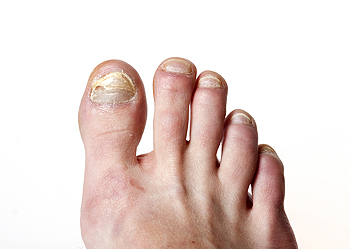 There are several early signs that can indicate you may have toenail fungus. Such indicators may include the nails becoming thick and yellowed, and may crumble when touched. An infection is likely to develop if the nail is left untreated, allowing the fungus to grow. The aging process may be a factor in developing this ailment, in addition to having poor blood circulation. Medical conditions such as eczema, psoriasis, or athlete’s foot allow easier access for the fungus to enter the body through the tiny openings in the skin these conditions may cause. Toenail fungus lives in moist environments, and socks and shoes that are worn without proper ventilation make it ideal for this fungus to grow. There are several ways to prevent this condition from developing, and these may include trimming the nails straight across, wearing appropriate shoes in public showers or pools, and utilizing a moisturizer to prevent cracked skin. A consultation with a podiatrist is suggested for a complete diagnosis and possible treatment options that are right for you.
There are several early signs that can indicate you may have toenail fungus. Such indicators may include the nails becoming thick and yellowed, and may crumble when touched. An infection is likely to develop if the nail is left untreated, allowing the fungus to grow. The aging process may be a factor in developing this ailment, in addition to having poor blood circulation. Medical conditions such as eczema, psoriasis, or athlete’s foot allow easier access for the fungus to enter the body through the tiny openings in the skin these conditions may cause. Toenail fungus lives in moist environments, and socks and shoes that are worn without proper ventilation make it ideal for this fungus to grow. There are several ways to prevent this condition from developing, and these may include trimming the nails straight across, wearing appropriate shoes in public showers or pools, and utilizing a moisturizer to prevent cracked skin. A consultation with a podiatrist is suggested for a complete diagnosis and possible treatment options that are right for you.
For more information about treatment, contact Brent Harwood, DPM of Southeast Podiatry. Our doctor can provide the care you need to keep you pain-free and on your feet.
Toenail Fungus Treatment
Toenail fungus is a condition that affects many people and can be especially hard to get rid of. Fortunately, there are several methods to go about treating and avoiding it.
Antifungals & Deterrence
Oral antifungal medicine has been shown to be effective in many cases. It is important to consult with a podiatrist to determine the proper regiment for you, or potentially explore other options.
Applying foot powder on the feet and shoes helps keep the feet free of moisture and sweat.
Sandals or open toed shoes – Wearing these will allow air movement and help keep feet dry. They also expose your feet to light, which fungus cannot tolerate. Socks with moisture wicking material also help as well.
If you have any questions please feel free to contact one of our offices located in Fairhope, Brewton, and Atmore, AL . We offer the newest diagnostic tools and technology to treat your foot care needs.
Read more about Toenail Fungus